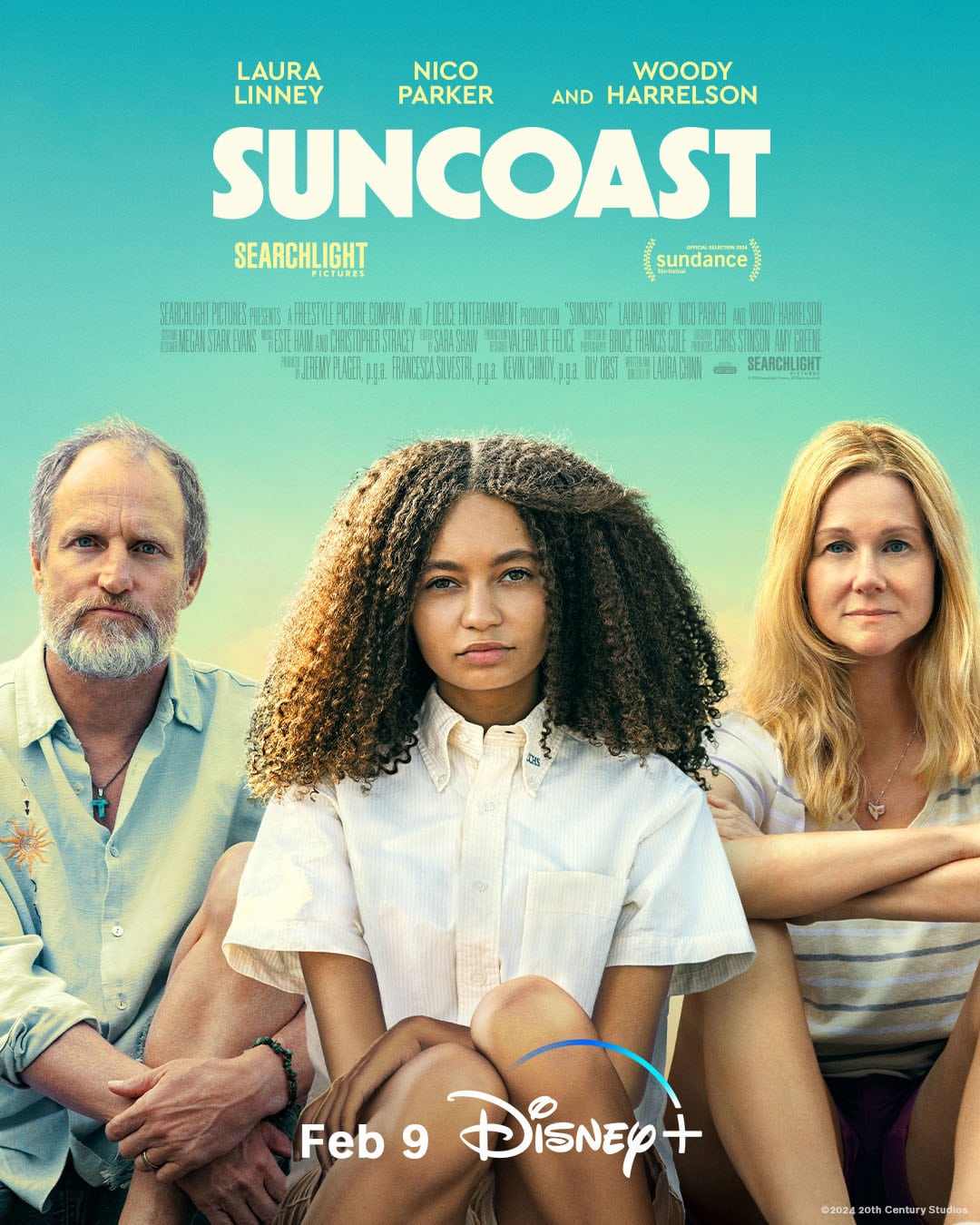
- Starring
- Nico Parker, Laura Linney, Woody Harrelson
- Writer
- Laura Chinn
- Director
- Laura Chinn
- Rating
- R (United States)
- Running Time
- 109 minutes
- Release Date
- February 9th, 2024
Overall Score
Rating Summary
In 1998, Michael Schiavo argued that his wife Terri—who suffered a cardiac arrest eight years earlier and had since been in a permanent vegetative state—would not have wanted her irreversible suffering to be prolonged, and subsequently requested that her feeding tube be removed. Terri’s parents disputed this decision and, believing it worthwhile to keep their daughter on artificial life support, took Michael to court. The resulting back-and-forth led to a highly publicized case on the ethics of assisted death that stretched all the way to 2005, when the plug was finally pulled and Terri was laid to rest. It is precisely here that Laura Chinn’s autobiographical debut Suncoast begins, already deep in the throes of this heated debate when she herself was dealing with a similar case in her own life. That the Schiavo case exists in the background of Chinn’s own meditation on grief and the inevitability of death is a testament to the film’s desire to tackle such trying issues, and its inability to do so head-on.
The year is 2005—for those unaware of the Schiavo case going in, Chinn utilizes a clever bit of context to establish the period with a bonding moment based on the tabloid breakup of Brad Pitt and Jennifer Aniston—and Doris (Parker) is dealing with the impending loss of her older brother Max, who’s been suffering from brain cancer since well before the start of the film. He can’t see, he can’t speak, he can’t move, and as far as Doris is concerned, he can’t even register her presence, which makes confrontations with her overbearing and panicked mother Kristine (Linney) an everyday occurrence as she tries to live her life independently from caring for her dying sibling. As Max is moved to the titular Suncoast living centre where the terminally ill are sent for care, Doris’s inner turmoil puts her in the path of Paul (Harrelson), an aggrieved protester outside the centre, advocating for Terri Schiavo’s life (as she too was being cared for at the facility).
The fact that Chinn’s debut script is based off her own personal experiences losing a loved one is arguably enough to shield it from criticisms of an inauthentic portrayal of grief. At a crucial moment in the film, Doris expresses in her ethics class—a class that has been debating the worth of interfering in affairs such as assisted suicide or abortions—that one can never establish the truly “right” position in a situation because they are simply not the person going through that hardship. So even if one has experienced similar circumstances to Doris’s own (as this writer has), her process feels either more or less detached than what they would expect is simply all part of the process. The problem is just that there are so many angles that Suncoast can take (and that it alludes to), but Chinn seems a bit too unsure of how the uniqueness of this situation can be translated into a worthwhile story.
The entire cast is quite good, but that doesn’t mean everyone here is necessary; the film’s imbalance essentially starts and ends with the inclusion of Harrelson as Doris’s guardian angel shepherding her through this process. There’s simply no reason for this character to exist, as his only purpose here seems to be expounding clichéd advice and orchestrating saccharine bonding experiences to help make this situation more palatable. But even as Harrelson’s well-meaning warmth shines through his hippie facade, Parker’s own reticence in the process of establishing herself at school and making new friends tells us more about her position than any interaction the two of them share. The stickiness of high school vanity and genuine friendship that forms with these popular kids is interesting enough to sustain Doris’s journey, but by the time the film reaches its inevitable closing point, it becomes difficult to believe what she claims to have experienced if all audiences had to go on was Paul telegraphing it all. Had the film cut him out entirely and dedicated more time to Doris’s complicated relationships with her peers, Suncoast would have a much firmer leg to stand on in contrast with Linney’s frustrated and manic demeanour.
In the end, what perhaps what keeps Suncoast at a distance is the fact that audiences enter the story with Max already in a catatonic state, and with no flashbacks to establish his relationship with Doris, the director really leaves audiences to take her word for it when she says that she never truly knew her brother. That’s by all means a completely valid take on the inexplicable conflicts that come with grief—and it adds credence to the mother’s own frustration at her daughter’s difficulty to fully grasp the situation at hand—but Laura Chinn’s decision to wrap it all up in a Disney-fied package that tries to focus on feel-good sentiment in the face of such a complicated situation only serves to highlight that something here is missing.
Part of the hardship of grieving is that one may not know exactly what is missing, but Suncoast is imbalanced enough in its attempted takeaway to make it clear that something here is missing.
still courtesy of Searchlight Pictures
If you liked this, please read our other reviews here and don’t forget to follow us on Twitter or Instagram or like us on Facebook.
